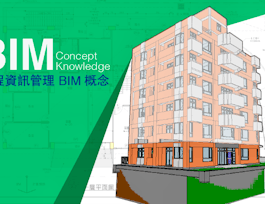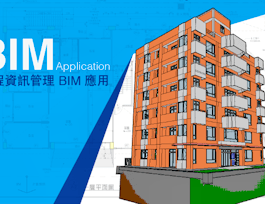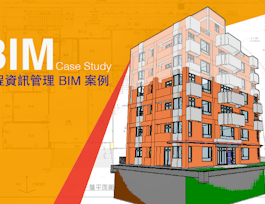In this course, you will understand the practical applications of Building Information Modeling (BIM) with reference to field applications, 4D BIM, and 5D BIM. "Documentation & Common Data Environment (CDE)" covers ISO 19650 standards, including networking (LAN, WAN, cloud computing), CDE concepts, file naming conventions, BIM team roles, and RFI and review processes. "Introduction to 4D BIM/Field BIM" addresses construction scheduling, Gantt charts, and integrates 3D BIM models into 4D modeling with practical demonstrations and workflows for comparing planned versus actual schedules and generating reports. "Application of Field BIM/4D" focuses on collaboration, site utilization planning, 3D control and planning, safety protocols using BIM and CDEs, digital fabrication, scan-to-BIM processes, existing condition modeling, and as-built record models. "Introduction to 5D, AIM" introduces 5D BIM and Asset Information Modeling (AIM), covering quantity takeoff methods, cost breakdowns, COBie, space attributes, and facility management integration for efficient project delivery and asset management. "Beyond BIM - Emerging Trends" explores industrial construction techniques, IoT, Big Data, data analytics, AI, ML applications, and Digital Twin technology, expanding your understanding of cutting-edge BIM applications and trends.



Field BIM
This course is part of Building Smarter: BIM in Practice Specialization

Instructor: Subject Matter Expert
Included with 
Recommended experience
What you'll learn
"Field BIM" covers BIM applications in construction, CDE importance in BIM, followed by 4D BIM, its preparation, implementation, and applications
The course explores 4D BIM applications like site planning, construction analysis, 3D coordination, and safety, 5D BIM and Asset Information Model
Emerging trends beyond BIM including IoT, Digital Twins, Scan to BIM, Big Data, and AI/ML, highlighting future directions in construction technology
Modules include CDE, 4D/Field BIM intro, practical 4D applications in construction, advanced 4D/BIM uses, 5D BIM, AIM, and emerging BIM trends
Skills you'll gain
- Proficiency in 4D BIM for construction scheduling and project visualization
- Field BIM expertise for safety management and onsite hazard mitigation
- Advanced documentation management including 2D drawing generation and CDE implementation
- Quantitative analysis through 5D BIM with focus on quantity take-off and cost estimation
- Understanding emerging trends like IoT, big data, AI/ML, and digital twins in BIM applications
Details to know

Add to your LinkedIn profile
August 2024
6 assignments
See how employees at top companies are mastering in-demand skills

Build your subject-matter expertise
- Learn new concepts from industry experts
- Gain a foundational understanding of a subject or tool
- Develop job-relevant skills with hands-on projects
- Earn a shareable career certificate


Earn a career certificate
Add this credential to your LinkedIn profile, resume, or CV
Share it on social media and in your performance review

There are 6 modules in this course
The module "Documentation & Common Data Environment (CDE)" teaches how to manage construction project information effectively. Topics include creating 2D drawings from BIM models, understanding computer network types and cloud computing, and using CDE for information sharing. You'll also learn about file naming conventions, roles and responsibilities in projects, and the Request For Information (RFI) process. This module equips you with essential skills for organized project documentation and efficient data management.
What's included
14 videos1 assignment1 discussion prompt
The module "Introduction to 4D / Field BIM" provides a comprehensive introduction to integrating time and scheduling into Building Information Modeling (BIM) for construction projects. Participants will learn about construction sequencing and project scheduling, including the use and limitations of Gantt charts. The course explores 4D BIM, covering its modeling principles and demonstrating its application through project demos. Participants will gain insights into 4D BIM workflows, comparing planned schedules with actual progress, and generating essential reports for project management and evaluation purposes.
What's included
11 videos1 assignment1 discussion prompt
The module "Application of Field BIM / 4D - Part 1" focuses on practical uses of Building Information Modeling (BIM) and 4D technology in construction projects. Participants will delve into 3D coordination and visual communications across multiple parts, learning how to enhance project clarity and collaboration. The module covers site utilization planning techniques to optimize construction efficiency, supported by detailed construction analysis spanning various aspects and phases. Participants will also explore 3D control and planning methodologies, equipping them with skills to effectively manage and coordinate project activities using advanced BIM tools and strategies
What's included
11 videos1 assignment1 discussion prompt
The module "Application of Field BIM / 4D - Part 2" delves into advanced applications of Building Information Modeling (BIM) and 4D technology in construction management. Participants will explore BIM's role in enhancing safety practices, covering topics such as fall prevention, formwork safety, and electrical hazards. They will also learn about disaster and risk analysis using digital tools, and delve into digital fabrication techniques for construction efficiency. Additionally, the module covers methods for modeling existing conditions, converting scans to BIM models, and creating accurate as-built records, providing a comprehensive understanding of advanced BIM applications in construction projects.
What's included
21 videos1 assignment1 discussion prompt
The module "Introduction to 5D, AIM" introduces participants to the integration of cost estimation and asset information management (AIM) within Building Information Modeling (BIM). It covers fundamental concepts of 5D BIM, focusing on quantity take-off methodologies using various units of measurement and cost analysis techniques. Participants will gain hands-on experience through instructor-led demonstrations and exercises in quantity take-off for different building elements. The module also explores Level of Development (LOD) standards and their role in accurate quantity estimation. Additionally, it addresses cost control strategies through 5D BIM and discusses asset information modeling, COBie standards, space attributes, and information exchange for efficient facility management.
What's included
20 videos1 assignment1 discussion prompt
The module "Beyond BIM, Emerging Trends" explores advanced applications and future directions in the field of Building Information Modeling (BIM). Participants will delve into the industrialization of construction through BIM, focusing on Design for Manufacture and Assembly (DfMA) principles across multiple parts. They will also learn about integrating Internet of Things (IoT) technology with BIM, harnessing big data for informed decision-making, and applying data analytics through AI and machine learning in construction projects. The module introduces concepts of smart infrastructure and the development of digital twins for connected infrastructure, emphasizing their benefits, requirements for success, and diverse applications across industries, particularly in smart cities and national contexts.
What's included
13 videos1 assignment1 discussion prompt
Instructor

Offered by
Recommended if you're interested in Environmental Science and Sustainability

Columbia University

National Taiwan University

National Taiwan University

National Taiwan University
Why people choose Coursera for their career





Open new doors with Coursera Plus
Unlimited access to 7,000+ world-class courses, hands-on projects, and job-ready certificate programs - all included in your subscription
Advance your career with an online degree
Earn a degree from world-class universities - 100% online
Join over 3,400 global companies that choose Coursera for Business
Upskill your employees to excel in the digital economy
Frequently asked questions
Access to lectures and assignments depends on your type of enrollment. If you take a course in audit mode, you will be able to see most course materials for free. To access graded assignments and to earn a Certificate, you will need to purchase the Certificate experience, during or after your audit. If you don't see the audit option:
The course may not offer an audit option. You can try a Free Trial instead, or apply for Financial Aid.
The course may offer 'Full Course, No Certificate' instead. This option lets you see all course materials, submit required assessments, and get a final grade. This also means that you will not be able to purchase a Certificate experience.
When you enroll in the course, you get access to all of the courses in the Specialization, and you earn a certificate when you complete the work. Your electronic Certificate will be added to your Accomplishments page - from there, you can print your Certificate or add it to your LinkedIn profile. If you only want to read and view the course content, you can audit the course for free.
If you subscribed, you get a 7-day free trial during which you can cancel at no penalty. After that, we don’t give refunds, but you can cancel your subscription at any time. See our full refund policy.

